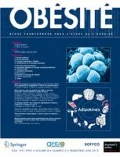Résumé
Il est désormais largement admis que le surpoids et la sédentarité sont responsables d’une proportion importante de tumeurs solides, ce qui soulève d’importants problèmes de santé publique. Plusieurs questions demeurent concernant les mécanismes de carcinogenèse pouvant être impliqués. Il est par ailleurs de plus en plus probable que le surpoids soit un facteur pronostique, notamment dans le cancer du sein. Enfin, la question du retentissement de la prise de poids après cancer sur le risque de rechute reste ouverte. Cela revêt une importance particulière dans la mesure où les plans Cancer 2 et 3 mettent notamment l’accent sur la prévention tertiaire, au moyen du Programme Personnalisé de l’Après-Cancer.
Abstract
It is now admitted that the overweight and sedentary behaviour are responsible for an important proportion of solid tumours what rises of important public health problems. Several questions remain concerning the mechanisms of carcinogenesis, which can be involved. It is besides highly probable that the overweight is a prognostic factor, especially in the breast cancer. Finally, the impact of weight gain after cancer on the risk of relapse remains open. It takes on particular importance as far as the plans Cancer 2 and 3 emphasize in particular the tertiary prevention, by means of the Personalized Program of After Cancer.
Références
Pierce JP, Natarajan L, Caan BJ et al (2007) Influence of a diet very high in vegetables, fruit and fiber, and low in fat on prognosis following treatment for breast cancer: the Women’s Healthy Eating and Living (WHEL) randomized trial. J Am Med Assoc 298: 289–298
Chlebowski RT, Blackburn GL, Thomson CA, et al (2006) Dietary fat reduction and breast cancer outcome: Results from the Women’s Intervention Nutrition Study. J Natl Cancer Inst 96: 1767–1776
Morey MC, Snyder DC, Sloane R, et al (2009) Effects of homebased diet and exercise on functional outcomes among older, overweight long-term cancer survivors: RENEW: a randomized controlled trial. J Am Med Assoc 301:1883–1891
Demark-Wahnefried W, Platz EA, Ligibel JA, et al (2012) The role of obesity in cancer survival and recurrence. Cancer Epidemiol Biomarkers Prev 21: 1244–1259
De Pergola G, Silvestris F (2013) Obesity as a major risk for breast cancer. J Obesity 2013:291546. doi: 10.1155/2013/291546
Macis D, Gandini S, Guerrieri-Gonzaga A, et al (2012) Prognostic effect of circulating adiponectin in a randomized 2x2 trial of low-dose tamoxifen and fenretinide in premenopausal women at risk for breast cancer. J Clin Oncol 30: 151–157
Protani M, Coory M, Martin JH (2010) Effect of obesity on survival of women with breast cancer: systematic review and metaanalysis. Breast Cancer Res Treat 123:627–635
Ewertz M, Jensen MB, Gunnarsdóttir KÁ, et al (2011) Effect of obesity on prognosis after early-stage breast cancer. J Clin Oncol 29: 25–31
CJ. Creighton, A Casa, Z Lazard, et al (2008) Insulin-Like Growth Factor-I Activates Gene Transcription Programs Strongly Associated With Poor Breast Cancer Prognosis. J Clin Oncol 25: 4078–4085
Law JH, Habibi G, Hu K, et al (2008) Phosphorylated insulinlike growth factor-i/insulin receptor is present in all breast cancer subtypes and is related to poor survival. Cancer Res 68:10238–10246
Caan BJ, Kwan ML, Weltzien E, et al (2011) Weight gain after a breast cancer diagnosis and breast cancer outcomes. Proceedings AACR Meeting 2011. Abstract 3722. Cancer Res 8 supplement 1: 3722
Zelek L, Czernichow S, Galan P, Hercberg S. Risk factors for relative weight gain >10% in breast cancer survivors. Findings from the SU.VI.MAX. cohort. San Antonio Breast Cancer Symposium 2011, P4-12–06
Druesne-Pecollo N, Touvier M, Barrandon E, et al (2012) Excess body weight and second primary cancer risk after breast cancer: a systematic review and meta-analysis of prospective studies. Breast Cancer Res Treat 135: 647–654
Chlebowski RT, Blackburn GL, Elashoff RM, et al Mature analysis from the women’s intervention nutrition study (WINS) evaluating dietary fat reduction and breast cancer outcome. San Antonio Breast Cancer Symposium 2006, Abstract #32
Gonzales-Angulo A, Meric-Bernstam F (2010) Metformin: a therapeutic opportunity in breast cancer. Clin Cancer Res 16: 1695–1700
Colon and rectum. In: World Cancer Research Fund / American Institute for Cancer Research. Food, nutrition, physical activity, and the prevention of cancer: a global perspective. Washington DC: AICR, 2007; 280–288
Meyerhardt JA, Catalano PJ, Haller DG, et al (2003) Influence of body mass index on outcomes and treatment related toxicity in patients with colon carcinoma. Cancer 98: 484–495
Meyerhardt JA, Giovanucci EL, Holmes MD et al (2006) Physical activity and survival after colorectal cancer diagnosis. J Clin Oncol 24: 3527–3534
Meyerhardt JA, Niedzewcki D, Hollis D et al (2007) Association of dietary patterns with cancer recurrence and survival in patients with stage III colon cancer. J Am Med Assoc 298:754–764
JA. Meyerhardt, D Niedzwiecki, D Hollis, et al (2008) Impact of Body Mass Index and Weight Change After Treatment on Cancer Recurrence and Survival in Patients With Stage III Colon Cancer: Findings From Cancer and Leukemia Group B 89803. J Clin Oncol 26: 4109–4115
Courneya KS, Booth CM, Gill S, et al (2008) The colon health and lifife-long exercise change trial: a randomized trial of the National Cancer Institute of Canada Clinicals Trials Group. Curr Oncol 15: 271–278
Cancer Survivors. In: World Cancer Research Fund / American Institute for Cancer Research. Food, nutrition, physical activity, and the prevention of cancer: a global perspective. Washington DC: AICR, 2007; 342–347
Pierce JP, Stefanick ML, Flatt SW et al (2007) Greater survival after breast cancer in physically active women with high vegetable-fruit intake regardless of obesity. J Clin Oncol 25: 2345–2351
Pierce JP, Natarajan L, Caan BJ, et al (2009) Dietary change and reduced breast cancer events among women without hot flashes after treatment of early-stage breast cancer: subgroup analysis of the Women’s Healthy Eating and Living Study. Am J Clin Nutr 89: 1565S–1571S
Author information
Authors and Affiliations
Corresponding author
Rights and permissions
About this article
Cite this article
Zelek, L., Spano, J.P. Obésité et cancers : de la prévention primaire à la prévention tertiaire. Obes 9, 221–224 (2014). https://doi.org/10.1007/s11690-014-0430-4
Published:
Issue Date:
DOI: https://doi.org/10.1007/s11690-014-0430-4

